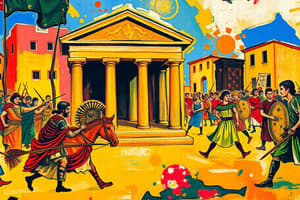Podcast
Questions and Answers
Who was the Roman general who crucified 6,000 slaves after the third servile war?
Who was the Roman general who crucified 6,000 slaves after the third servile war?
Papius
The Roman general Poppy was a relative of the city of Pompeii.
The Roman general Poppy was a relative of the city of Pompeii.
False (B)
The idea of civitas and civic duty was established during the Roman Republic, ensuring that power was distributed evenly among citizens.
The idea of civitas and civic duty was established during the Roman Republic, ensuring that power was distributed evenly among citizens.
True (A)
What economic challenge did the Roman Republic face, making it vulnerable to disruptions in food supply?
What economic challenge did the Roman Republic face, making it vulnerable to disruptions in food supply?
What Roman military reform was introduced by Marius?
What Roman military reform was introduced by Marius?
What was the result of the civil war between Marius and Sulla?
What was the result of the civil war between Marius and Sulla?
What were Sulla's "prescriptions"?
What were Sulla's "prescriptions"?
During Sulla's dictatorship, many Romans were accused of fabricated crimes to justify their punishment?
During Sulla's dictatorship, many Romans were accused of fabricated crimes to justify their punishment?
The Roman troops during Sulla's reign were primarily loyal to the idea of Rome and its republic?
The Roman troops during Sulla's reign were primarily loyal to the idea of Rome and its republic?
Even though it was still considered a republic, Rome functioned as an empire at this time.
Even though it was still considered a republic, Rome functioned as an empire at this time.
Flashcards
Servile Wars
Servile Wars
Slaves revolting against the Roman Empire, culminating in brutal Roman punishment.
Nias Papius (Poppy)
Nias Papius (Poppy)
A Roman general, noted for crucifying 6,000 slaves.
Civitas
Civitas
Concept of civic duty and balanced government in Rome.
Roman Republic's Empire
Roman Republic's Empire
Signup and view all the flashcards
Marius Reforms
Marius Reforms
Signup and view all the flashcards
Rome's Food Supply Dependence
Rome's Food Supply Dependence
Signup and view all the flashcards
Civil War (Marius-Sulla)
Civil War (Marius-Sulla)
Signup and view all the flashcards
Sulla's Prescriptions
Sulla's Prescriptions
Signup and view all the flashcards
Political Purges
Political Purges
Signup and view all the flashcards
Military Loyalty
Military Loyalty
Signup and view all the flashcards
Food Shortages
Food Shortages
Signup and view all the flashcards
Political Instability
Political Instability
Signup and view all the flashcards
Political Enemies
Political Enemies
Signup and view all the flashcards
Crop Failures
Crop Failures
Signup and view all the flashcards
Grain Imports
Grain Imports
Signup and view all the flashcards
Ship Sinkings
Ship Sinkings
Signup and view all the flashcards
Study Notes
Roman Slave Revolt and Punishment
- 6000 slaves crucified after the third servile war, part of a brutal Roman punishment.
- Roman general, Papius (aka Poppy), oversaw this execution.
Roman Republic & Empire Transition
- Rome became a dominant power in the Mediterranean after defeating Carthage.
- Marius's reforms enhanced the military, although Rome was essentially an empire already, operating as an empire even though it was still formally a Republic.
- Rome's reliance on grain imports (especially from North Africa and Egypt) made it vulnerable to disruptions like shipwrecks or crop failures.
- Food shortages in Rome were a serious issue.
Roman Civil Wars and Political Turmoil
- Marius and Sulla engaged in a civil war, concluding with Sulla's victory.
- Sulla implemented proscriptions, a practice where political rivals were publicly branded enemies of Rome and targeted for death and removal from their positions.
- Sulla's actions caused widespread political unrest and violence, weakening the state.
- Military loyalty often belonged to generals more than to the Republic (as Rome's ideal was changing and being challenged).
Studying That Suits You
Use AI to generate personalized quizzes and flashcards to suit your learning preferences.




